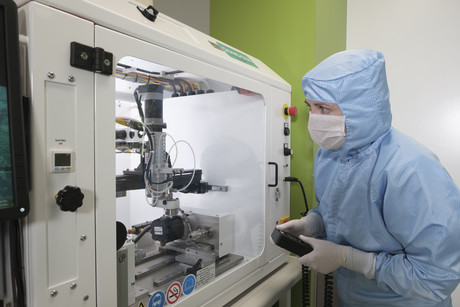M2 facility to keep Australia's medtech industry healthy

CSIRO, Monash University and the Monash Health Translation Precinct (MHTP) have announced the creation of M2 — a new facility that combines technology, research and medical science.
M2 has been described by CSIRO as a ‘one-stop shop’ that will bring the best minds and technology together to turn great ideas into a reality for Australia’s flourishing medtech industry, benefiting millions of patients as a result. The precinct was launched last week by Minister for Industry, Innovation and Science Arthur Sinodinos at CSIRO’s new Biomedical Materials Translation Facility (BMTF) in Clayton, Victoria.
“From life-changing cochlear implants to life-saving vaccines, world-first 3D-printed bone and tissue replacements, Australia has an incredible track record when it comes to medical technologies and pharmaceuticals,” Sinodinos said.
“M2 will help to accelerate development of technology like this, not only vital for the improvement of the lives of Australians facing medial challenges, but also leading to job and economic growth for Australia.”
Australia is home to more than 500 companies working in the medical technologies and pharmaceuticals (MTP) sector, many of which can struggle to make the expensive, time-consuming transition from prototype to clinically tested product. M2 intends to close this gap for Australian businesses, providing a research ecosystem to transition new discoveries from the bench to prototyping, preclinical testing, industry evaluation and commercialisation.
“M2 leverages some of Australia’s best medtech expertise, experience and equipment,” said CSIRO Director of Manufacturing Dr Keith McLean.
“When a company comes to us we can use CSIRO and MHTP facilities to develop and analyse production-scale prototypes, whilst the Monash Biomedical Imaging facility can provide advanced preclinical and clinical testing and imaging.”
“This initiative will deliver real health benefits to all Australians,” added Monash University Provost and Senior Vice-President Professor Marc Parlange. “Our healthcare spending is expected to almost double to 16% of GDP by 2040. Cheaper and more effective medical solutions are better for our health and Australia’s financial future.”
argenx and Monash University partner against autoimmune diseases
To advance a pioneering molecule for autoimmune diseases, global immunology company argenx has...
Archer completes potassium sensing alpha prototype
Quantum technology company Archer Materials Limited has developed an early Biochip prototype...
Farm animals and aquaculture cryopreservation partnership announced
Vitrafy Life Sciences Limited has announced that it has entered a 12-month exclusive agreement...



